
Helping People Fear Bad Food and Beverages
 Nutrition Live Online 2020 opened with NIH Director Francis Collins and the Presidential Symposium on the ethics of eating. We had expected to be wowed by Director Collins. And of course, he is impressive. However, Harvard’s Anna Grummond impressed us even more. She explained that it’s ethically OK to put warnings on food that might work by manipulating people with negative emotions. A little fear or worry is necessary to make them avoid bad food, according to this rationale. The end game is to curb chronic diseases and this strategy is growing more popular.
Nutrition Live Online 2020 opened with NIH Director Francis Collins and the Presidential Symposium on the ethics of eating. We had expected to be wowed by Director Collins. And of course, he is impressive. However, Harvard’s Anna Grummond impressed us even more. She explained that it’s ethically OK to put warnings on food that might work by manipulating people with negative emotions. A little fear or worry is necessary to make them avoid bad food, according to this rationale. The end game is to curb chronic diseases and this strategy is growing more popular.
But we’re not so sure that trying to make the public fear foods and beverages is a good strategy.
Weak Evidence
The explicit goal of putting warnings on food is to improve public health. Prevent chronic diseases. Certainly, we have a growing global problem with chronic diseases. Obesity is causing more and more diabetes, heart disease, liver disease, and a number of specific cancers. It’s an undeniable problem.
However, the evidence that government-mandated warnings on food will prevent any obesity is weak. As Grummond noted clearly, we have very little research to demonstrate an effect on health outcomes. Instead, she relies on the ability to change very specific behaviors through warnings that rely on negative emotions.
The trouble is that dietary behaviors are very complex and adaptive. If you persuade me to stop drinking a sugary beverage, fine. I’ll get a bottle of water and pick up a sticky bun. Or something else. The possibilities are just about infinite. This is why folks in the UK are finding that merely targeting sugary beverages is not enough. They want to move on to target confections and cakes, too.
Unintended Consequences
Then we come to the problem of unintended consequences. Is it a good thing to use fear and worry, even in small doses, to govern eating behaviors of the public?
In the case of something that is clearly a danger, the answer is definitely yes. No doubt. People should fear foods that have not been handled safely. Labeling trans fats in foods was a success, because it cleared the way for eliminating this harmful substance from the food supply.
But when the evidence is limited, as it is with many other food warnings, caution would be wise. Ximena Ramos Salas explains:
An unintended consequence of these policies and programs is excessive weight preoccupation among the population, which can lead to stigma, body dissatisfaction, dieting, disordered eating, and even death from effects of extreme dieting, anorexia, and obesity surgery complications, or from suicide that results from weight-based bullying.
David Allison and Andrew Brown discussed these issues in the AMA Journal of Ethics. They wrote that it’s unwise to assume that obesity-related policies cause no harm or that achieving a health benefit overrides respect for other values and principles.
No matter how attractive a health policy might seem, assuming that the ends justify the means is dangerous. Especially when the evidence that the policy will achieve the stated goal is limited.
Click here for a poster by Grummon on this subject at the meeting, here for Ramos Salas’ paper, and here for the paper by Brown and Allison. If you’re registered and signed in to the meeting you can view Grummon’s presentation here.
Tower of Terror, painting by Nicholas Roerich / WikiArt
Subscribe by email to follow the accumulating evidence and observations that shape our view of health, obesity, and policy.
June 2, 2020

June 02, 2020 at 3:23 pm, Allen Browne said:
Wow – deeper and more complex than usual, but after reading it a couple of times:
The changing behavior business is a little like a new operation or technique “looking for an application”. The bottom line is that the patients’ health improves – no more no less.